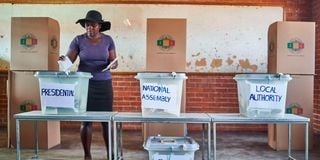SADC pokes holes in Zimbabwe elections

A woman casts her vote at a polling station during Zimbabwe's presidential and legislative elections in Bulawayo on August 23, 2023. Zimbabweans on August 23, 2023 began voting in closely-watched presidential and legislative elections.
Southern African Development Community (SADC) bloc on Friday poked holes in Zimbabwe’s just concluded elections, in a rare public reprimand of a member state by the group.
SADC said the elections did not meet principles and guidelines governing the conduct of democratic elections.
The refusal by the regional body to endorse the August 23 polls may be seen as huge dent for Zimbabwe, which has been struggling to shake-off its pariah status for decades.
Preliminary results showed that President Emmerson Mnangagwa’s ruling Zanu PF and the main opposition Citizens Coalition for Change (CCC) were running neck and neck in parliamentary elections.
Presidential election results are yet to be announced after voting was extended by a day in some urban wards due to the late printing of ballot papers.
SADC observers led by former Zambian vice president Nevers Mumba said while the polls were largely peaceful, they did not meet regional standards.
“Mission observed that the pre-election and voting phases, on 23-24 August 2023 harmonised elections were peaceful, and calm,” Dr Mumba said.
“The mission noted that some aspects of the harmonised elections, fell short of the requirements of the constitution of Zimbabwe, the Electoral Act, and the SADC Principles and Guidelines Governing Democratic Elections (2021).
“The mission commends the people of Zimbabwe for maintaining a peaceful political environment during the pre-election period, and on voting day.
“In the event of any electoral disputes, the mission appeals to all contestants to channel their concerns through established legal procedures and processes.”
Former Nigerian President Goodluck Jonathan, who is heading the joint African Union and COMESA observer missions, said the elections were generally peaceful.
“The elections were conducted in a generally peaceful and transparent manner despite the logistical challenges affected the voting material,” Mr Jonathan said in his preliminary report.
The last time SADC refused to endorse Zimbabwean elections in 2008, then ruler Robert Mugabe was forced to form a unity government with the opposition.
President Mnangagwa has complained that some of the observers came with preconceived views about Zimbabwe’s elections, but his criticism was mainly aimed at Western groups.
His government has also been cracking down on local poll monitors and observers that it accuses of plotting to announce parallel results that favour the opposition.
On the eve of the elections, Zimbabwe deported at least six foreign researchers from South Africa and the United Kingdom after accusing them of trying to interfere in the polls.
The government also refused to accredit journalists from the Voice of America’s Zimbabwe service while local media practitioners said they were experiencing inordinate delays in getting accreditation from the electoral commission.
The United States’ Carter Centre said its observers were also being denied accreditation and that they were being demonised by the local state-controlled media.
The European Union observer mission last week said it had taken note of “unacceptable attempts to discredit” it after state-controlled media ran stories claiming that it bribed local journalists with whiskey and groceries.
President Mnangagwa, who came to power in 2017 following a military coup that toppled the late Mr Mugabe, has been accused of trying to rig the elections where he is seeking his last term.
He previously said he had invited foreign observers because Zimbabwe had nothing to hide as it was organising a clean election.





